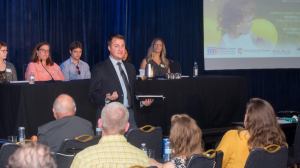Announcing a New FDA-Approved Patient-Focused Drug Development Meeting on Reducing Cardiac Late Effects
The virtual meeting on cardiotoxicities in childhood cancer survivors, hosted by Children's Cancer Cause and partners, will be held on September 15, 2022.
WASHINGTON, DC, USA, March 10, 2022 /EINPresswire.com/ -- Children’s Cancer Cause is pleased to announce an upcoming externally-led Patient-Focused Drug Development (PFDD) meeting on Reducing Cardiac Late Effects in Pediatric Cancer Survivors. The virtual meeting will be held on September 15, 2022. The conference is an opportunity for survivors and caregivers to educate representatives of the FDA, academic researchers, and pharmaceutical companies about their personal experiences managing the impact of cardiac late effects on daily living and long-term health.
Cardiotoxicities are among the most serious late effects experienced by survivors. Anthracyclines and radiation therapy are the backbone of life-saving treatment for a significant percentage of pediatric cancer patients, but they may come at a cost to the cardiovascular system. Childhood cancer survivors are at a 15-fold increased risk of developing congestive heart failure (CHF) and are at a seven-fold higher risk of premature death due to cardiac causes, when compared with the general population. Survivors who experience cardiac effects have a serious and chronic burden of disease that can increase with age and impact long-term well-being.
The PFDD Program was created by the FDA several years ago as a mechanism to more systematically gather information from patients and survivors about their conditions, available therapies, and what matters most to them in balancing risks and benefits. This information helps inform FDA’s drug development decision making process. Children’s Cancer Cause is grateful for FDA’s approval of the proposal, recognizing the importance of addressing a late effect of treatment that impacts a substantial number of survivors.
“Childhood cancer survivors are at a high risk for hypertension, diabetes, and obesity,” said Smita Bhatia, MD, MPH, Director of the Institute for Cancer Outcomes and Survivorship at the University of Alabama at Birmingham School of Medicine and a member of the Children's Cancer Cause Survivorship Advisory Council. “These conditions will further amplify the risk of anthracycline-related heart complications — as much as 8- to 10-fold. If we can reduce, limit, or even prevent the damage to the heart from the cancer treatment, and prevent or manage these other conditions, we can reduce the risks to heart health substantially.”
The meeting will address pediatric cancer survivors’ experiences managing the impact of cardiovascular late effects from cancer therapies. An important focus of the PFDD is to also explore survivors’ perspectives on the cardiac impact of cancer therapies among minority groups at higher risk for developing cardiotoxicities. Recent data indicate that pediatric cancer survivors of African ancestry appear to be disproportionately affected by cardiomyopathy. These findings are consistent with larger trends on health disparities among minority groups and deserve focused discussion to advance understanding of the late sequelae of cancer therapy in these children.
Children’s Cancer Cause is proud to have expertise from other advocacy groups and medical professional organizations in the development of the agenda and meeting content. Partners include the American Society of Clinical Oncology (ASCO), American Society of Pediatric Hematology/Oncology (ASPHO), B+ Foundation, and Teen Cancer America.
The meeting will feature presentations by survivors, parents, and medical specialists, with an opportunity for public comment and input, including facilitated discussions among panelists and the audience. Key issues to be addressed include:
- Burden of the condition (physical, emotional, financial) and the issues regarding daily health-related quality of life;
- Assessments of current and potential future treatments; and
- Benefits patients and survivors with cardiotoxicities are looking for in treatments and the risks they are willing to assume in return for more advanced interventions.
An important outcome from these meetings is a “Voice of the Patient” report to broadly share lessons learned from PFDD participants and medical experts. Children’s Cancer Cause is pleased to be able offer another PFDD, in follow-up to our 2018 conference on chemotherapy-induced hearing loss in pediatric cancer survivors. Among the key concerns expressed by participants is that those with hearing loss report severe social isolation and anxiety as their single most challenging quality of life issue, describing difficulties in trying to keep up at school or interact with colleagues at work.
If you are interested in participating in the cardiac late effects meeting, please visit childhoodcancerpfdd.org/cardiac-effects and fill out the interest form to be notified when registration is live.
# # #
ASCO® and American Society of Clinical Oncology® are registered trademarks of the American Society of Clinical Oncology, Inc. Used with permission.
# # #
Children’s Cancer Cause is the leading national policy and advocacy organization, working at the federal level to ensure that children have access to less toxic and more effective cancer therapies; to expand resources for research and specialized care; and to address the unique needs and challenges of childhood cancer survivors and their families.
Steve Wosahla
Children's Cancer Cause
+1 202-552-7392
info@childrenscause.org
Visit us on social media:
Facebook
Twitter
LinkedIn
Legal Disclaimer:
EIN Presswire provides this news content "as is" without warranty of any kind. We do not accept any responsibility or liability for the accuracy, content, images, videos, licenses, completeness, legality, or reliability of the information contained in this article. If you have any complaints or copyright issues related to this article, kindly contact the author above.

